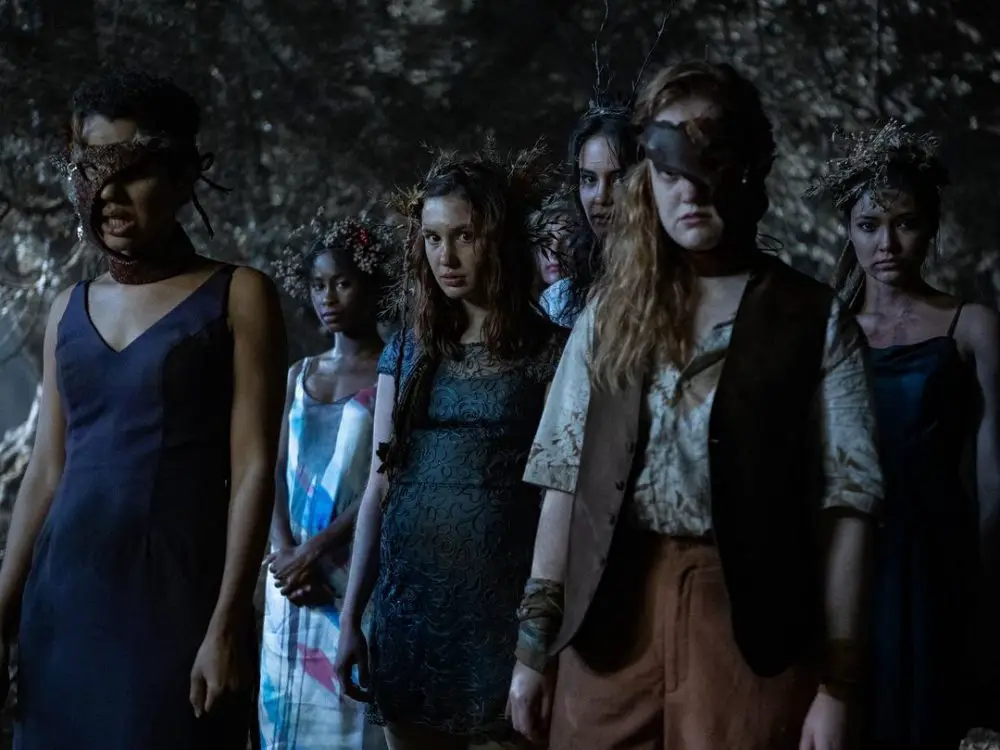Warning to the reader: This article contains spoilers for the first season of “Yellowjackets”!
A show with a mind of its own, HBO Max’s “Yellowjackets” follows the lives of four women in their 40s as they attempt and seemingly fail to heal from what happened in the wilderness so many years ago. Each character has moved on with their lives until this mysterious event comes back to haunt them and forces them to reevaluate the things they had done in the name of survival, all with subtle hints of occultism, cannibalism and the paranormal.
https://www.youtube.com/watch?v=sYznLoeS_mA
The show navigates the aftermath of a plane crash that strands a girls’ high school soccer team (the WHS Yellowjackets) in the deep wilderness. While there may be a second season in the works to tie together loose ends and expand further on the storyline, I still think elements were missing from “Yellowjackets” that could have made the viewing experience even better.
The series succeeds thanks in large part to its casting. The actors cast to play the younger versions of the show’s characters, especially Taissa, Shauna, Natalie and Misty, effectively reflect their older counterparts: Taissa’s determination, stubbornness and skepticism. Shauna’s discontent, unpredictability and emotional immaturity. Natalie’s drug dependence, loner lifestyle and suppressed feelings. Plus, Misty’s abnormal psyche, eagerness to help and people-pleasing. All these traits follow them from the wilderness to their present lives.
Taissa
Taissa was determined to win nationals in high school, resulting in her slide-tackling one of the first-year students and accidentally breaking her leg, causing the bone to puncture through the skin. In the present, Taissa is determined to win the Senate election, even if it means jeopardizing her entire family. Meanwhile, the show drops hints that Taissa is becoming possessed by a demon, as she was back in the woods all those years ago.
Taissa tends to be very headstrong, seen especially in flashbacks to the woods where she constantly scrapped with her teammates. Now, she refuses to listen to her wife, Simone, who believes their son, Sammy, needs to see a psychologist.
We soon learn that Sammy is not misbehaving or imagining things. Taissa has begun to “sleepwalk” just like she did in the wilderness, which results in Simone and Sammy moving out. Before leaving, Simone discovers Taissa’s offering table in their basement. It had Sammy’s doll, the head of the family dog who was thought to have run away, and what appears to be a human heart being offered to some higher power.
Ironically, one of Taissa’s most significant faults is her skepticism. She refused to believe something sinister or supernatural happened back at the cabin in the woods, where, in the attic, they found a rotting corpse that had a shotgun bullet in its head and cult-related carvings under the floorboards. In the present, she can’t wrap her head around what is happening with Sammy and believes he is making stuff up, when in reality, it’s her.
Shauna
Teenage Shauna was just as discontented, unpredictable and emotionally immature as her adult counterpart. As a teenager, Shauna lived an everyday life, albeit a dull one. She followed the rules, got straight A’s that got her into Brown University, and constantly lived in the shadow of her best friend, Jackie.
While this life of Shauna’s reveled in dissatisfaction, she had no problem having a teenage affair with Jackie’s boyfriend at the same time, which is just one example of Shauna’s fickleness. In addition, Shauna was just as emotionally immature as she was hormonal, which followed her into adulthood. To top it off, Shauna realized she was pregnant a few weeks after the plane crash.
In the present day, Shauna is a restless housewife in a household that consists of her, Jeff (Jackie’s high school boyfriend), and their daughter, Callie. When she gets into a fender bender with a younger man, it sparks an affair that becomes messy very quickly. Once Shauna’s life becomes chaotic, her frivolity becomes her.
She later stabs her lover to death after assuming he was the one blackmailing the Yellowjackets. Since Shauna wasn’t quite ready to have a child on top of being stuck in the middle of nowhere, she never fully matured emotionally. Her emotional instability has placed her in many hectic circumstances, especially when she was bored and craved excitement.
Natalie
Natalie, who had an abusive father who accidentally shot and killed himself and a distant and allegedly drug-addicted mother, fits into the “druggie loner” trope. She indulged in drugs and isolation, which essentially plunged her into depression. Natalie in the present still doesn’t seem to shake her habits after countless attempts in rehab, but one thing is clear: She is a survivor.
Natalie befriended one of her coaches’ sons, Travis, in the wilderness. They supposedly continued their codependent relationship after rescue, 19 months after the initial crash. The two relate to one another since they both have emotionally distant parents, and they connect in a time riddled with uncertainty. While the audience can see Natalie has a tough exterior, she is very affectionate and loyal to the ones she loves. I can only hope Natalie’s character can progress further than the typical addict while dealing with her daddy and mommy issues.
Misty
Lastly, Misty is probably the single most fascinating character on the show. Her sociopathic tendencies and assumed Munchausen syndrome by proxy make it difficult for fans to root for her. Misty is part of the JV soccer team and is invited to support the varsity team at nationals.
After the plane crash, Misty’s knowledge of first aid caused the other survivors, including one of the coaches she had a crush on, to become highly dependent on her — an experience she reveled in. As an adult, Misty works as a geriatric nurse, seemingly unliked by her co-workers and even her patients at times. While Misty means well, she often comes off as stalkerish and victimizing. To further clarify Misty’s unsettling behavior, she was the one who smashed the airplane’s flight recorder, which could’ve been used to save the team earlier.
As the four women are blackmailed in the present, Misty takes matters into her own hands. She drugs and kidnaps the thought-to-be blackmailer (a private detective hired by Taissa to investigate her past teammates to see if they talked about what happened in the wilderness) and keeps her in the basement for interrogation. This isn’t to say the other characters aren’t at fault for their murderous tendencies. However, I would imagine if the plane crash hadn’t happened, Misty would still be herself in the present.
I was genuinely intrigued by the storyline of “Yellowjackets” as it combines many tropes from drama, thriller, dark comedy, supernatural and horror. I was also pleased with the queer representation. It flowed very well in contrast to some modern films and television shows that either stereotype queer characters or awkwardly use queerness as a character’s single, identifiable trait. I thought the bits of dark mockery were intertwined well, considering trauma makes for stellar humor.
Some things I hope to see in the second season of “Yellowjacket” and beyond is sufficient additional gore, the return of other characters from the team such as Lottie Matthews, more “OMG” moments, and the unexplored months of the story where the girls strayed, starved and scavenged, leading them to become bewitched by the wilderness’s supernatural forces, which I confidently assume will all be provided.

















